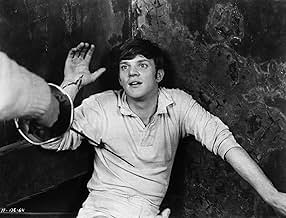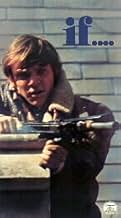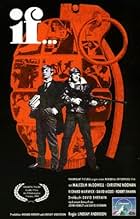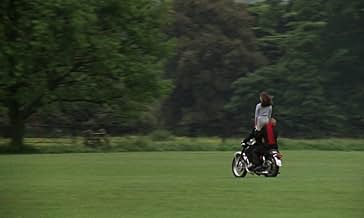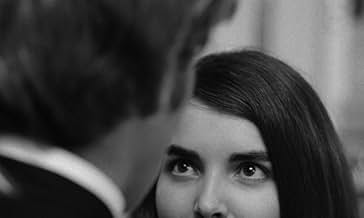IMDb-BEWERTUNG
7,4/10
26.064
IHRE BEWERTUNG
In dieser allegorischen Geschichte führt der Schüler Mick Travis in einer etablierten Privatschule in England eine Rebellion an.In dieser allegorischen Geschichte führt der Schüler Mick Travis in einer etablierten Privatschule in England eine Rebellion an.In dieser allegorischen Geschichte führt der Schüler Mick Travis in einer etablierten Privatschule in England eine Rebellion an.
- Nominiert für 2 BAFTA Awards
- 2 Gewinne & 4 Nominierungen insgesamt
Mary MacLeod
- Mrs. Kemp - Staff
- (as Mary Macleod)
Empfohlene Bewertungen
My word!
"If.." has always been a firm favourite of mine, particularly as I have been in much the same situation (minus B+W/Colour changes, and gun battles, naturally), and indeed still consider myself a hair rebel. It captures perfectly the horrors of public shool-The fawning, smarmy head-master, the rigors of cadet training and founder's day, it's all drawn from horrible reality.
Saw a late night showing yesterday, and on the cinema screen the fabulous direction and power of the photography- so still and unobtrusive, yet so iconic-becomes apparent. That final looped shot of Mick firing the brenn Gun is just stunning! I left the cinema feeling so goddamn moved!
At times the sheer 60s-ness, and random dialogue ("I like Johnny") can seem to undermine the viewing experience, but the spirit of bold rebellion which saturates this marvelous film wins you over. A favourite joke which I had never spotted before, is near the start, where the whips tick off a list that goes something like "Measles, tape worm, conformation class"..marvellous..
GO SEE!!
"If.." has always been a firm favourite of mine, particularly as I have been in much the same situation (minus B+W/Colour changes, and gun battles, naturally), and indeed still consider myself a hair rebel. It captures perfectly the horrors of public shool-The fawning, smarmy head-master, the rigors of cadet training and founder's day, it's all drawn from horrible reality.
Saw a late night showing yesterday, and on the cinema screen the fabulous direction and power of the photography- so still and unobtrusive, yet so iconic-becomes apparent. That final looped shot of Mick firing the brenn Gun is just stunning! I left the cinema feeling so goddamn moved!
At times the sheer 60s-ness, and random dialogue ("I like Johnny") can seem to undermine the viewing experience, but the spirit of bold rebellion which saturates this marvelous film wins you over. A favourite joke which I had never spotted before, is near the start, where the whips tick off a list that goes something like "Measles, tape worm, conformation class"..marvellous..
GO SEE!!
The first entry to the Mick Travis trilogy ("If...", 1968, O Lucky Man, 1973, and "Britannia Hospital", 1982), "If.." is a surreal black comedy about an English private boys' school and a student rebellion. In his three films, Anderson had covered all aspects, politics, and institutions of British Society from 1968 to 1982 with its complex system of class differences and privileges. "If..." which was released in 1968 at the peak of youthful rebellion in Europe and USA, received BAFTA and Golden Globe nominations and won the Golden Palm at the Cannes Film Festival where it competed with 27 films from all over the world.
Anderson was in part inspired by Jean Vigo's 41 minutes long "Zero for conduct" (1933) about the similar to "If..." subject. Like in Vigo's film, Anderson inserts some surrealistic episodes shot in black-and-white and according to him, it was driven by budget rather than style. Malcolm McDowell in his first big screen role and the first of three Mick Travis' movies is a charismatic leader of the rebel students who call themselves the Crusaders and like to break the rules. The cruel corporal punishments from the faculty and the older students provoked a bloody uprising against the school system.
Made almost 40 years ago, "If.." still has a power to shock as well as to entertain and it remains an outstanding and controversial depiction of the problems that have not disappear from the English public school system or from any school system as well as from society in general.
I am sure that Stanley Kubrick saw "If..." and was impressed by McDowell's debut performance, by his charisma that shines through his close-ups and especially in the final shot of "If...", and by his face that strangely combines innocence and youthful openness with cynical scornful almost reptilian contempt for humanity. I believe that "If..." was the reason Kubrick offered the part of charming psychopath Alex to the young actor.
Anderson was in part inspired by Jean Vigo's 41 minutes long "Zero for conduct" (1933) about the similar to "If..." subject. Like in Vigo's film, Anderson inserts some surrealistic episodes shot in black-and-white and according to him, it was driven by budget rather than style. Malcolm McDowell in his first big screen role and the first of three Mick Travis' movies is a charismatic leader of the rebel students who call themselves the Crusaders and like to break the rules. The cruel corporal punishments from the faculty and the older students provoked a bloody uprising against the school system.
Made almost 40 years ago, "If.." still has a power to shock as well as to entertain and it remains an outstanding and controversial depiction of the problems that have not disappear from the English public school system or from any school system as well as from society in general.
I am sure that Stanley Kubrick saw "If..." and was impressed by McDowell's debut performance, by his charisma that shines through his close-ups and especially in the final shot of "If...", and by his face that strangely combines innocence and youthful openness with cynical scornful almost reptilian contempt for humanity. I believe that "If..." was the reason Kubrick offered the part of charming psychopath Alex to the young actor.
'If...' is a fascinating and powerful film set in an oppressive and archaic public (that's private to us non-Brits) school. It is one of the most original and innovative of all British movies of the 60s, a decade which began in some ways with 'Peeping Tom' and ended with 'Performance', two much maligned movies which in hindsight are astonishing achievements. 'If..' is equally as striking (and disturbing) as those two criminally underrated movies, but in contrast actually achieved quite a level of popularity on its original release. Even so I don't believe the movie gets the attention it deserves. Hopefully it will be rediscovered by a new generation of movie lovers as it is still very relevant and powerful even now, thirty five years later. Malcolm McDowell (his film debut) stars as the ring-leader of a small group of dissatisfied students who don't fit in with their ultra-conformist contemporaries. His performance is first rate, and in several scenes you can almost see Alex, his droog to be ('A Clockwork Orange'). The movie mixes documentary like realism with fantasy sequences involving "The Girl" (Christine Noonan), and eventually violent rebellion. A movie very much of its time it still is very watchable today and has lost little of its power and ability to surprise. Lindsay Anderson, arguably Britain's most underrated director, continued to expand upon McDowell's Mick Travis character in two subsequent movies, but 'If..' has a very different feel from those "sequels", if they can truly be termed that, and can be watched as a stand alone movie. I was impressed with this movie when I first saw it on black and white TV as a young lad, and I was still impressed when I watched it again the other week. And I will guarantee it will not be my last viewing of this brilliant film! A must see for anyone with any interest whatsoever in 1960s pop culture or film.
This glorious 1968 film is a document not just of its times but of the eternal and mysterious communion between two enormous artists. Lindsay Anderson, the director, the mentor, the older man and Malcolm McDowell his young, brilliant, loving disciple. The trust between this two men is overwhelming and the results are in every frame in every nuance. For me, to see this film after many years was a remarkable emotional experience. Daring, visionary with a Malcolm McDowell that broke new ground with the fearlessness of an explorer venturing into totally virgin territory. Brilliant, beautiful, unique. Lead by the magical hand of Anderson and McDowell we confront the anger of the artists with their love for each other. Wow!
The best film ever made about school life; the rituals, the drudgery, the humiliation and ultimately the excitement. Anderson's masterpiece works on a number of levels, not least as one of the cinema's great pieces of surrealism. It's a state of the nation movie, a fantasy, an account of public school life told with an almost documentary-like precision and it's as fresh today as it was when it first appeared, (hard to believe that was almost 40 years ago or that Malcom McDowell was ever this young).
Using Jean Vigo's "Zero De Conduite" as a template, (it's not a remake), Anderson's movie is quintessentially youthful and so accurately does it depict its milieu as to appear almost arrogant. He handles revolution with a grandstanding authority and homosexual, (and heterosexual), schoolboy yearning more romantically than any other film I can think of, (Wallace's display in the gymnasium as blonde, beautiful, tousle-haired Bobby Phillips looks on is blissfully homo-erotic), and he does this with a masterly control of the medium. (His comments about financial restraints dictating the fluctuations between black-and-white and colour photography may well be true but the choices seem inspired, nevertheless and the great Miroslav Ondricek's camera-work is superb).
He was also a great actor's director, often working with many of the same actors both in theatre and in cinema and he extracts marvellous performances from the likes of Arthur Lowe, Peter Jeffrey, Mona Washborne and Geoffrey Chater representing the Establishment as well as pitch-perfect performances from David Wood, Richard Warwick, Rupert Webster, Robert Swann and Hugh Thomas, all new to cinema, as the students.
The film made Malcom McDowell a star and for a few short years, (here, in "O Lucky Man", as Alex in "A Clockwork Orange"), that star burned brightly before he sold out to Hollywood and his career began to flounder in a series of mediocre American movies, reaching a nadir with "Caligula". But his performance as Mick Travis is a marvel and both it and the film that first encapsulated it remain among the finest achievements in British cinema.
Using Jean Vigo's "Zero De Conduite" as a template, (it's not a remake), Anderson's movie is quintessentially youthful and so accurately does it depict its milieu as to appear almost arrogant. He handles revolution with a grandstanding authority and homosexual, (and heterosexual), schoolboy yearning more romantically than any other film I can think of, (Wallace's display in the gymnasium as blonde, beautiful, tousle-haired Bobby Phillips looks on is blissfully homo-erotic), and he does this with a masterly control of the medium. (His comments about financial restraints dictating the fluctuations between black-and-white and colour photography may well be true but the choices seem inspired, nevertheless and the great Miroslav Ondricek's camera-work is superb).
He was also a great actor's director, often working with many of the same actors both in theatre and in cinema and he extracts marvellous performances from the likes of Arthur Lowe, Peter Jeffrey, Mona Washborne and Geoffrey Chater representing the Establishment as well as pitch-perfect performances from David Wood, Richard Warwick, Rupert Webster, Robert Swann and Hugh Thomas, all new to cinema, as the students.
The film made Malcom McDowell a star and for a few short years, (here, in "O Lucky Man", as Alex in "A Clockwork Orange"), that star burned brightly before he sold out to Hollywood and his career began to flounder in a series of mediocre American movies, reaching a nadir with "Caligula". But his performance as Mick Travis is a marvel and both it and the film that first encapsulated it remain among the finest achievements in British cinema.
Wusstest du schon
- WissenswertesA British ambassador called the film "an insult to the nation". The then Lord John Brabourne read an early draft and called it "the most evil and perverted script I've ever read. It must never see the light of day".
- PatzerWhen Mick is standing in front of the Trueform shoe store, the camera and crew members are seen reflected in the windows of a passing bus.
- Zitate
Mick Travis: One man can change the world with a bullet in the right place.
- Crazy CreditsThe film's opening prologue states: Wisdom is the principal thing; therefore get wisdom: and with all thy getting get understanding PROVERBS IV:7
- Alternative VersionenIn the USA, the film was originally released uncut, with an X rating. However, a more commercial rating was preferred and the film was reissued with an R rating after scenes of male frontal nudity were removed from the shower scenes.
- VerbindungenFeatured in Horizont (1971)
- SoundtracksSanctus
from the "Missa Luba" (Philips Recording)
Sung by Les Troubadours du Roi Baudouin (uncredited)
Conducted by Fr. Guido Haazen O.F.M (uncredited)
Top-Auswahl
Melde dich zum Bewerten an und greife auf die Watchlist für personalisierte Empfehlungen zu.
- How long is If....?Powered by Alexa
Details
- Laufzeit
- 1 Std. 51 Min.(111 min)
- Farbe
- Sound-Mix
- Seitenverhältnis
- 1.66 : 1
Zu dieser Seite beitragen
Bearbeitung vorschlagen oder fehlenden Inhalt hinzufügen


